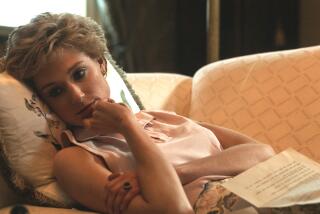Mother Teresa or Mrs. Simpson: Which Was the Real Diana?
- Share via
To say that Diana, Princess of Wales, was killed by those seeking publicity is as absurd as it is to say that she was killed by seeking it herself. The speed limits are the same for everybody; there are some dangers from which a bodyguard cannot protect you; if you wish to dine incognito, then it is probably best to avoid the Paris Ritz.
These are the few, paltry “lessons” of her death. It is human and natural to attempt to invest accidents with meaning, but the urge to do so is not always controlled by the rational faculty. Look at the simple members of the British public, carpeting the approach to Buckingham Palace with flowers. After all this drama and strife, they have not grasped the salient fact that Diana no longer was a member of the royal family; that, indeed, that family had cast her out and now, grotesquely, becomes the proprietor of her children.
We ought to beware of too easy a surrender to the vicarious identification that makes us address people whom we have never met (“Di,” “O.J.,” “Ollie”) by their first names. This synthetic informality may mask hysterical symptoms. With one hand, we deplore the cult of “celebrity” and the celebration of the nonevent; with the other, we forward both these phenomena by our very language. This was not, as some oafish spokesman from Buckingham Palace apparently told CNN, “an accident waiting to happen.” It was just an accident, of the sort that happens to people whether they symbolize “life in the fast lane” or otherwise.
Princess Diana had only been free of her miserable marriage for a year and a day when she was killed, so we will never know what kind of adult she might have become. In one incarnation, the angel of mercy in Angola and Bosnia, she not only looked fetching but actually had the power to alter policies and opinions. (One of her last acts was to break with protocol and issue a stern attack on the former British government for its blinkered policy on land mines.) In the other incarnation, she was drawn to jet-setting, disco-minded, super-rich sybaritism. It is a safe bet that, if she had carried on her relationship with Dodi Fayed, son of billionaire Mohammed Fayed, she would have been swallowed up by the world of the brittle and the spoiled and might even have ended up in the Paris chateau--now owned by the uncontrollably ambitious Fayed senior--in which the Duke of Windsor and Mrs. Simpson ended their ill-spent days. Now we will never know which aspect of her character would have emerged as the dominant one.
These and other speculations are enough to dispense with the stupid call for more laws to protect the “privacy” of the rich and famous. In the greater part of her public life, Princess Diana was a voluntary member of a controversial hereditary monarchy. In pursuit of a personal solution to an unhappy private life, she became an assiduous leaker to the press. The first thing deserved public scrutiny and the second one invited it.


